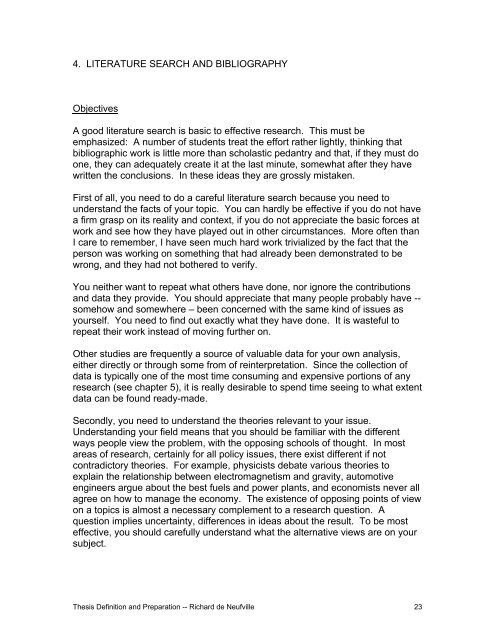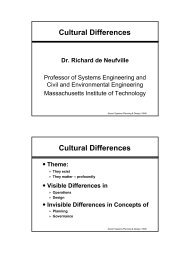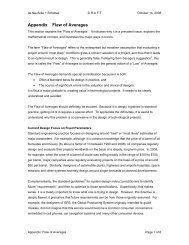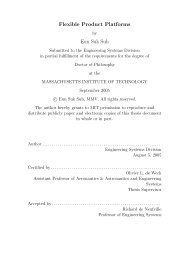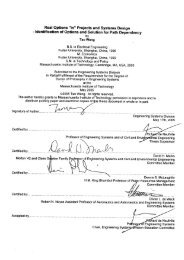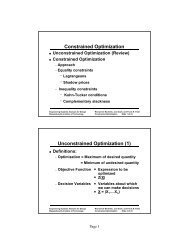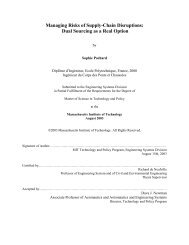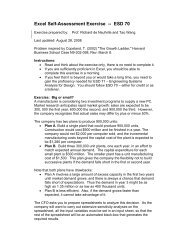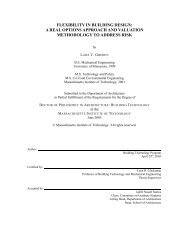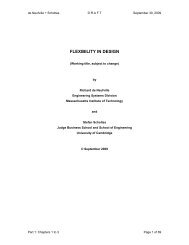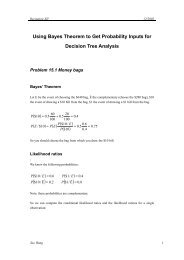Richard de Neufville's TPP SM Thesis Manual - Title Page - MIT
Richard de Neufville's TPP SM Thesis Manual - Title Page - MIT
Richard de Neufville's TPP SM Thesis Manual - Title Page - MIT
- No tags were found...
You also want an ePaper? Increase the reach of your titles
YUMPU automatically turns print PDFs into web optimized ePapers that Google loves.
4. LITERATURE SEARCH AND BIBLIOGRAPHYObjectivesA good literature search is basic to effective research. This must beemphasized: A number of stu<strong>de</strong>nts treat the effort rather lightly, thinking thatbibliographic work is little more than scholastic pedantry and that, if they must doone, they can a<strong>de</strong>quately create it at the last minute, somewhat after they havewritten the conclusions. In these i<strong>de</strong>as they are grossly mistaken.First of all, you need to do a careful literature search because you need toun<strong>de</strong>rstand the facts of your topic. You can hardly be effective if you do not havea firm grasp on its reality and context, if you do not appreciate the basic forces atwork and see how they have played out in other circumstances. More often thanI care to remember, I have seen much hard work trivialized by the fact that theperson was working on something that had already been <strong>de</strong>monstrated to bewrong, and they had not bothered to verify.You neither want to repeat what others have done, nor ignore the contributionsand data they provi<strong>de</strong>. You should appreciate that many people probably have --somehow and somewhere – been concerned with the same kind of issues asyourself. You need to find out exactly what they have done. It is wasteful torepeat their work instead of moving further on.Other studies are frequently a source of valuable data for your own analysis,either directly or through some from of reinterpretation. Since the collection ofdata is typically one of the most time consuming and expensive portions of anyresearch (see chapter 5), it is really <strong>de</strong>sirable to spend time seeing to what extentdata can be found ready-ma<strong>de</strong>.Secondly, you need to un<strong>de</strong>rstand the theories relevant to your issue.Un<strong>de</strong>rstanding your field means that you should be familiar with the differentways people view the problem, with the opposing schools of thought. In mostareas of research, certainly for all policy issues, there exist different if notcontradictory theories. For example, physicists <strong>de</strong>bate various theories toexplain the relationship between electromagnetism and gravity, automotiveengineers argue about the best fuels and power plants, and economists never allagree on how to manage the economy. The existence of opposing points of viewon a topics is almost a necessary complement to a research question. Aquestion implies uncertainty, differences in i<strong>de</strong>as about the result. To be mosteffective, you should carefully un<strong>de</strong>rstand what the alternative views are on yoursubject.<strong>Thesis</strong> Definition and Preparation -- <strong>Richard</strong> <strong>de</strong> Neufville 23


